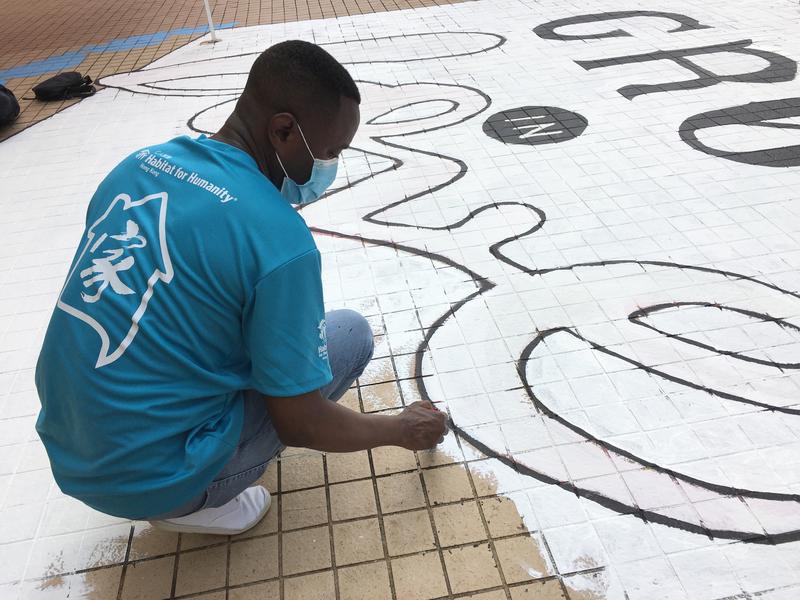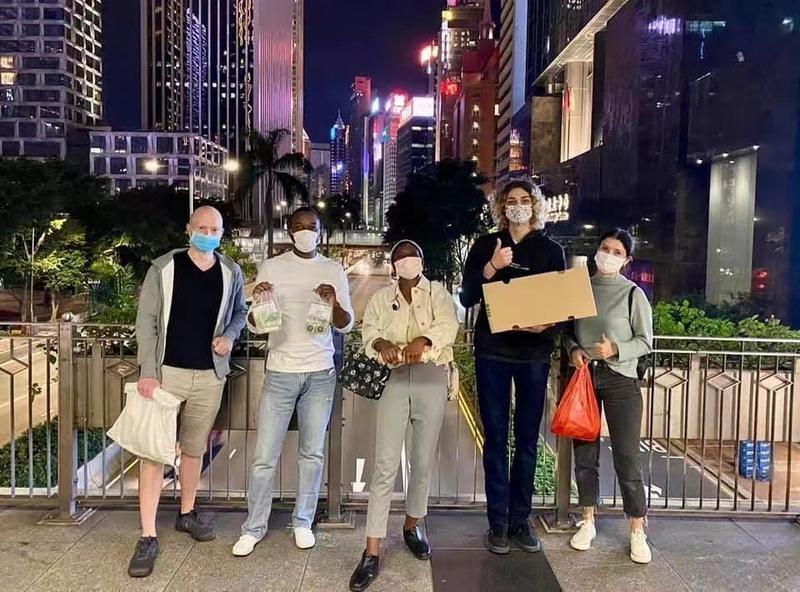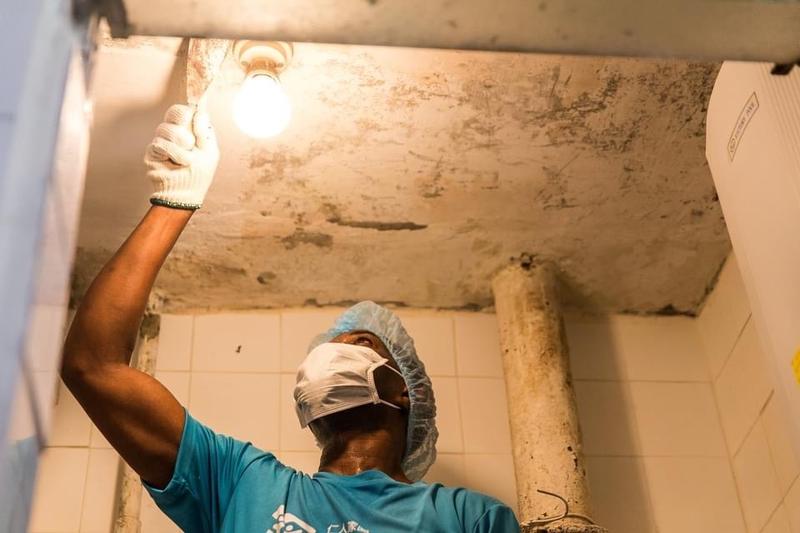A Zambian professional who sees Hong Kong as his second hometown lends a helping hand to the homeless in the city, hoping to give them basic supplies and dignity to fight the virus. Zhang Tianyuan reports from Hong Kong.
 Kabange decorates the ground of a local school as part of Habitat for Humanity’s project to spruce up campuses. (PHOTO PROVIDED TO CHINA DAILY)
Kabange decorates the ground of a local school as part of Habitat for Humanity’s project to spruce up campuses. (PHOTO PROVIDED TO CHINA DAILY)
When Sanday Chongo Kabange spotted her at a park in North Point in late November, the old woman with disheveled gray hair was sleeping on cardboard, wearing threadbare clothes against the windy chill. Kabange gently woke her up and handed her masks and alcohol sanitizers.
The woman was one of many such homeless people in Hong Kong that Kabange has helped. Kabange, who has been doing volunteer work since 2017, said the number of people sleeping on the street is increasing because of coronavirus outbreaks.
I regard Hong Kong as my second hometown, and I want to give back to society. ... I decided to be one of the many people that help to make Hong Kong an equal and better place.
Sanday Chongo Kabange, a business-risk mangaer and veteran volunteer in Hong Kong
A survey completed in early July by seven local non-governmental organizations showed the number of people sleeping on the streets had reached 983, accounting for 64 percent of city people experiencing homelessness. Almost all industries have been hit by the pandemic, with gloomy job prospects and dwindling openings. A quarter of respondents in the survey said they lost their jobs because of the pandemic, and a third had previously lived and worked both on the Chinese mainland and in Hong Kong, but were forced to return to the city after checkpoint closures.
“We as individuals must contribute our part and work together as a whole to combat the pandemic otherwise we will be confined at home with surging cases for the rest of the year,” Kabange said.
Destitute and homeless, those vulnerable people cannot afford even a mask to protect themselves from the highly-transmissible virus. “If they have HK$10 ($1.28), they will of course choose to buy a piece of bread to survive instead of a mask,” Kabange said. “It is unfair that some people have anti-pandemic gear, but others don’t.”
 Sanday Chongo Kabange (second from left) poses for a group photo with other volunteers in Wan Chai after distributing supplies to homeless people on Nov 15.
(PHOTO PROVIDED TO CHINA DAILY)
Sanday Chongo Kabange (second from left) poses for a group photo with other volunteers in Wan Chai after distributing supplies to homeless people on Nov 15.
(PHOTO PROVIDED TO CHINA DAILY)
Hailing from the landlocked south-central African country of Zambia, Kabange studied journalism at the University of Hong Kong in 2011. His experience as a reporter gave him an insight into the disparities between rich and poor in Hong Kong. He now works as a business-risk manager at a multinational consultant company.
“I regard Hong Kong as my second hometown, and I want to give back to society,” Kabange said. Hong Kong is faced with severe social issues like the wealth gap, he said, adding, “I decided to be one of the many people that help to make Hong Kong an equal and better place.”
The pandemic has widened the yawning wealth gap in Hong Kong, one of the world’s most expensive cities. The jobless rate climbed 0.6 percentage points to 4.5 percent between December and February, compared with the period from November to January, according to the Census and Statistics Department. Research from the Paris School of Economics published in 2021 said the city’s top 1 percent of earners received a bigger portion of the total wage bill than the bottom 50 percent of earners.
 Kabange removes flaking from the ceiling in a project run by the charity Habitat for Humanity that helps the elderly and people with disabilities to repair their aging or damaged homes. (PHOTO PROVIDED TO CHINA DAILY)
Kabange removes flaking from the ceiling in a project run by the charity Habitat for Humanity that helps the elderly and people with disabilities to repair their aging or damaged homes. (PHOTO PROVIDED TO CHINA DAILY)
“We are not born equal, not everybody can easily access financial or other professional resources, so we need to share resources,” Kabange said.
“The ultimate goal is not always to give (those vulnerable people) what they want, but rescue them off the street to help them find employment opportunities or realize their dreams.”
Hong Kong Chief Executive Carrie Lam Cheng Yuet-ngor announced on Friday a HK$31 billion ($4 billion) Employment Support Scheme, which will benefit up to 1.3 million residents.
Kabange has been a volunteer with different NGOs, including HandsOn Hong Kong and ImpactHK, for more than four years. The activities include giving food, clothes, hygiene necessities to senior residents who live alone, low-income families or homeless people; collecting waste on beaches; assisting older adults with cleaning homes, and painting school walls.
 Kabange provides food for those in need and removes waste from the neighborhood. (PHOTO PROVIDED TO CHINA DAILY)
Kabange provides food for those in need and removes waste from the neighborhood. (PHOTO PROVIDED TO CHINA DAILY)
Kabange said one of the challenges of being a volunteer faced with a formidable daily caseload is the worry of becoming infected. “The status of the person that I aid, whether he or she is infected or vaccinated, is unknown.” He has had three shots and uses self-test kits every day in order to continue his voluntary work.
“The kindness in humanity prevails the public health. I do precautions for myself, then I can offer protection to others. It is my duty to help somebody.”
Out of love for Hong Kong and faith in creating an equal society, Kabange contributes his leisure time every night from Monday through Friday seeking out homeless people on Hong Kong Island and providing help.
 Kabange provides food for those in need and removes waste from the neighborhood. (PHOTO PROVIDED TO CHINA DAILY)
Kabange provides food for those in need and removes waste from the neighborhood. (PHOTO PROVIDED TO CHINA DAILY)
“As I have been doing this volunteer work for the past few years, some people (who sleep on the street) become friends with me and look forward to meeting me every other day.”
Most supplies like rapid antigen test kits that Kabange and his team members distribute during weekdays are collected by NGOs. However, he said, “The donations are not always sufficient, and sometimes what they want is not provided by charity institutions.” In those cases, he pays with his own earnings to support the homeless with food such as instant noodles and beverages.
“Each time I give assistance to those who are in need, I feel happy, as I made a small difference in someone’s life, and I feel proud as they can have something to protect themselves after getting supplies,” Kabange said.
Contact the writer at tianyuanzhang@chinadailyhk.com



